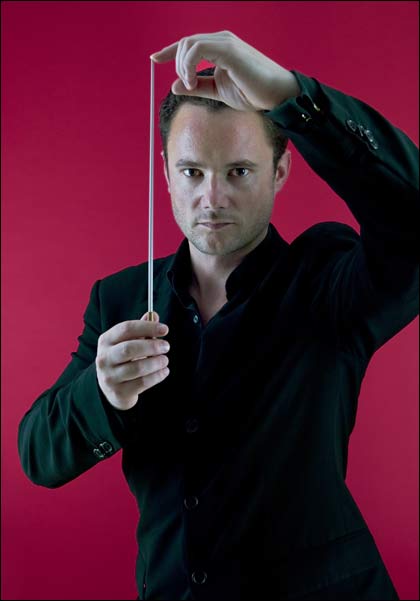Oregon Bach Festival 2011:
Superhero, Saint, Believer Marin Alsop conducts Honeggers “Joan of Arc at the Stake”
Appear and Inspire Matthew Halls may be a “frustrated singer,” but he makes musicians smile
A Maestros Life Story Sara Rilling finds purpose writing about her famous father
OBF 2011 Oregon Bach Festival sked & highlights!
Appear and Inspire
Matthew Halls may be a “frustrated singer,” but he makes musicians smile
by Suzi Steffen
 |
When Matthew Halls arrived in Colorado in early June to begin rehearsals for the Central City Operas Amadigi di Gaula, a North American premiere of one of Handels operas, he got lightheaded from the altitude.
He should maybe get used to it.
His home base in London sits at sea level, of course, but this 37-year-old British conductor is now a high-flying Baroque specialist, founder and artistic director of the red-hot England-based Retrospect Ensemble, former artistic director of the Kings Consort, accomplished opera conductor and, as his agents website says, a specialist in all music Germanic.
Add to it that hes an Oxford-educated former cathedral organist, an expert harpsichord player and what he calls a somewhat frustrated singer (“I have a deep desire to still be singing,” he says, noting that his instrument isnt quite as strong as hed like it to be for performance-level singing), and Halls starts to look like what those circling the Bach Festival have said for a while now: Hes one of the potential successors to the artistic director position when Helmuth Rilling retires.
Not that anyone wants to push founder and Artistic Director Rilling out, least of all Halls, he says. “The only thing Ive heard about [the idea of me as a successor] is from whats been published in the press,” he says. “In the short term, my job is to come to Oregon this year and make some exciting musical performances.”
Those performances begin with a non-musical gig, a free “Lets Talk” program at noon July 5 at the Hults Studio space down by the Jacobs Gallery. There, hes set to discuss his July 7 concert, titled “In Praise of St. Cecilia,” with music by Henry Purcell, Benjamin Britten and Georg Friedrich Handel.
When he started talking with OBF Executive Director John Evans about conducting a concert at the festival, Halls says, they chatted about the 2011 season theme of In Praise of Women. Halls came up with the idea of combining three specific pieces in a program devoted to St. Cecilia. “Theyre so contrasted, but theyre dealing with the same subject matter,” he says. Evans, originally from Wales, and Halls share a much more vast knowledge of Cecilia works than most U.S. musicians would imagine; it was long the custom in the U.K. for poets and composers to create odes to the third century martyr who became the patron saint of music.
Purcells “Welcome to all the pleasures” is an ode to Cecilia written to a text by Christopher Fishburn in 1683, when British musicians and the royal court had recently begun public celebrations for her saints day on Nov. 22 each year. That tradition had not ended when Britten wrote his “Hymn to St. Cecilia,” from a poem by W.H. Auden, between 1940 and 1942. Despite the hardship of WWII and the challenge of having the first section of his work confiscated by customs inspectors in N.Y., Britten rewrote and finished the piece, and it premiered on his birthday, St. Cecilias Day, 1942.
The Handel, possibly the most well known of the St. Cecilia works on this program, comes from 1697 texts by John Dryden. Handel wrote the piece for performance on St. Cecilias Day, 1739.
Thats quite a mix of years and composers (and texts), and Halls enjoys the challenge of the staging. “Well begin with the Purcell, which uses quite reduced forces, and then move to Britten with a mix ãand then to Handel, with everybody but the kitchen sink onstage,” he says with a laugh.
The lyrical, musical response to poetry charms Halls as well. “Writing about St. Cecilia, poets have always been so colorful in their language,” he says. Hes thinking particularly of Brittens musical setting for Audens words. “If you are a composer setting the text, you’re going to have a field day withcollages of choral sound worlds,” he says.
Despite his experience playing Bach on the keyboard, Halls says that as a conductor, he thinks like a singer. “I love finding the right shapes for the music,” he says. “As soon as you start thinking about music vocally, its different because the keyboard has limited means to shape the dynamic, but things like bowed instruments, oboes and singers have a massive range of dynamic possibilities.”
The July 7 concert starts at 7:30 pm at the Hult. After his talk on July 5, however, Halls also guest conducts one day of the Discovery Series, focusing on Bach Cantata 80, one of Helmuth Rillings favorites,better known to Protestants, especially Lutherans, in the U.S. as “A mighty Fortress is Our God.”
Halls also gives the Portland-area OBF fans a chance to see him at work when he conducts the Handel St. Cecilia again on July 9, as the first part of the final Portland concert, 7:30 pm at the Arlene Schnitzer Concert Hall (aka the Schnitz), which concludes with Rilling conducting Beethovens Ninth Symphony.
Despite his travels (the list of European and Asian opera and concert halls hes seen is frighteningly impressive), Halls has never been to Oregon before. Hes happy to say good things about the Bach Festival, however. “The singers Ive spoken to are unanimous in their praise for what happens at this festival,” he says. “They describe it as a melting pot of creativity, academic ideas and performances.”
Though hes in Colorado right up through the first half of the Bach Festival, hes looking forward to his arrival in Eugene. “This BRING’s exciting possibilities,” he says. “Ive heard that its absolutely wonderful. I cant wait to get there.”